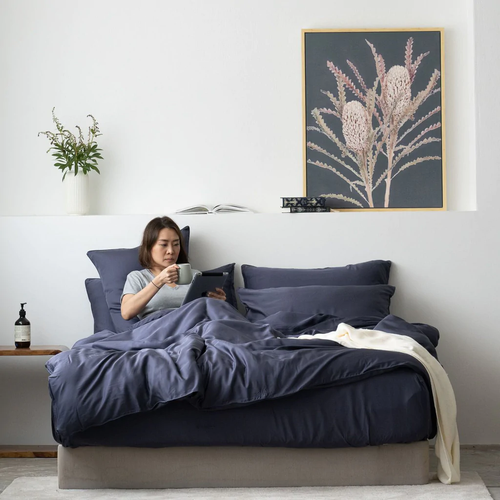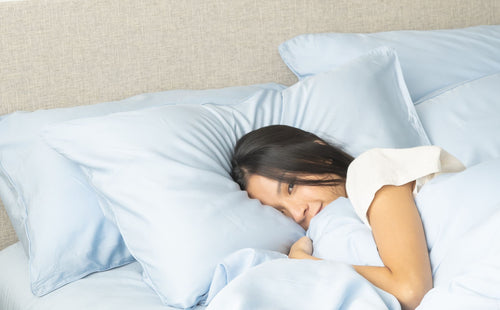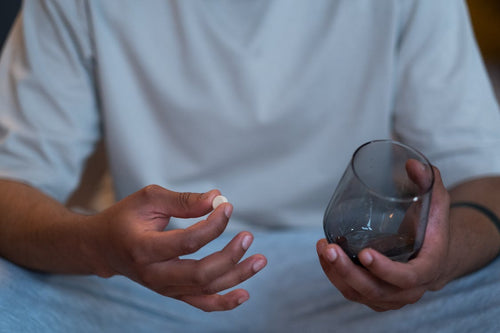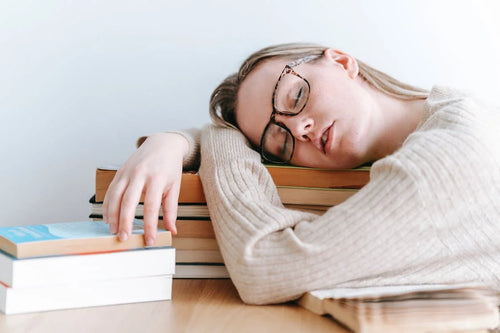Sleep is essential - that’s a fact. But is everything you know about it truthful? With a plethora of sleep myths floating around, the lines between fact and fiction are blurred. You’ve probably heard of these misconceptions numerous times that they’re already etched in your practices as indisputable.
Untrue facts about sleeping can lead to misplaced worries or, worse, wreak havoc on your lifestyle. Unknowingly, these could be causing sleep deprivation only disguised as helpful advice. Busting sleep myths will help us wake up to the truth, understand our bodies better, and ultimately get blissful rest.

Featuring Weavve’s TENCEL™ Lyocell Deluxe Set in Midnight Blue
From snoring to forcing sleep, let us put these false sleeping facts to rest as we shed light on the truth behind good sleep.
Myth #1: Everyone needs 8 hours of sleep every night
You might be wondering: is 6 hours of sleep enough? Should I hit that much-coveted 8-hour uninterrupted rest to feel recharged? How much deep sleep is enough?
The truth is it depends. Just like how each body is unique, individuals also have different sleep requirements. Note that longer slumber isn’t always better, the best is the one that fits your body’s needs.
 Featuring Weavve’s TENCEL™ Lyocell Deluxe Set in Cloud White
Featuring Weavve’s TENCEL™ Lyocell Deluxe Set in Cloud White
According to WebMD, 7 to 9 hours is the most common sleep duration among adults. Some can go up to 10-12 hours while a few people can function with as little as 6 hours of rest. Five hours or less is not recommended for adults, though some stick to a segmented sleep cycle. They may opt to rest 4 hours twice a day or whichever shifting system works for them.
To find out how many hours is ideal for you, track your bedtime hours then observe your mood and alertness level the day after. Drowsiness and the need for extra caffeine and sleep signal that you’re short on quality rest.
Myth #2: Lettuce water helps you sleep
For centuries, lettuce has been used as a sedative as it contains lactucarium. It has gained recent attention on TikTok as a cure for insomnia but no studies have proved the direct correlation between lettuce water consumption and induced slumber.

Image by mariana-delamura-gomes from Pexels
Myth #3: If you can’t fall asleep, it’s best to stay in bed
One of the false sleeping facts is that sleep can be forced. Simply closing your eyes shut won’t do. And constant tossing and turning in bed won’t help either.
If you are having difficulty drifting off within 20 minutes, dissociate your bed from your feeling of uneasiness. Get up, relax for a bit, and engage in low-impact activities. Try reading, listening to music, or meditating until you feel dozy.
You can also explore the relaxing 4-7-8 sleep trick or breathing technique. Breathe in for 4 seconds, hold the breath for 7 seconds, and exhale for 8 seconds.
Myth #4: Sleeping facing north is a big no-no

Featuring Weavve's TENCEL™ Lyocell Duvet
You’ve probably heard of a long-lived sleep myth that your resting position and direction can affect your health. Some traditions believe that spending the night with your head towards the north can cause nightmares and sleep paralysis.
This belief originated from ancient Hindus following the same principles as Feng Shui - the energy flow and magnetic forces of the Earth impact our lives. According to this philosophy, sleeping facing north coincides with the positive pole of the Earth, repelling your body’s positive pole at the head. Hence, the disrupted blood flow and rest.
It is worth noting there was a study countering this claim as it found that the north sleep position results in longer Rapid Eye Movement (REM) latency or deep sleep. However, until sufficient scientific evidence is revealed, the idea that sleep facing north directly influences sleep deprivation remains a myth.

Image by Andrea Piacquadio from Pexels
Experts are debunking sleep myths like this one, emphasizing that comfort matters more. If you can spend the night in a peaceful environment with ease, you are off to a good night's rest, regardless of direction.
Myth #5: Snoring is harmless
Mild snoring shouldn’t be worrisome. But when it becomes excessive and loud, it can be a sign of underlying health conditions like obstructive sleep apnea (OSA).
To reduce snoring, try treatments such as over-the-counter medications, positive airway pressure (PAP) devices, anti-snoring mouthpieces, or lifestyle adjustments related to losing weight.
Myth #6: Sleeping with wet hair gives you cold
One of the common sleep myths is that going to bed with wet hair will make you sick. There is some truth to this as doing so will run your scalp the risk of fungal infections, leading to dandruff formation and dermatitis. But it’s not the main culprit for viral diseases.

Image by cottonbro from Pexels
Sleeping in cold temperature levels won’t necessarily give you a cold. While you are most likely to get sick during rainy seasons, this is due to exposure to respiratory viruses, not how wet your hair is.
If you want to steer away from hair damage, it is best to wait for it to dry before bedtime. Take note of some precautions to protect your hair’s health when sleeping with wet hair.
Myth #7: Sleepwalking is not dangerous
Sleepwalkers can hurt themselves and others. There were reported cases of them jumping out the window, leaving home, driving, breaking things, etc.
If you see someone having a sleep walking episode, keep an eye on them and guide them back to bed safely. Wake them up if necessary.
Myth #8: Catching up on sleep resolves sleep deprivation

Featuring Weavve's Cotton Classic Set in Tea Rose
Sleeping in on weekends seems like a convenient remedy for sleep-deprived, overworked people. Some might think cutting back on rest during the busy workweek is fine as long as they can recover from sleep debt when they’re already free. Falling into this habit does more harm than good because of the changing patterns.
Yes, you may feel energized after gaining extended rest a few days a week. In sleep myths psychology, it may offer a false feeling of recovery. But in no way does it completely reverse the effects of sleep loss.
A deficit of one hour may take up to four days to recoup and your body needs up to nine days for it to return to baseline levels.
Myth #9: Exercising at night interferes with sleep

Image by jonathanborba from Pexels
Debunking sleeping misconceptions like this one might be the best thing that can happen to all fitness enthusiasts. No more skipping evening workouts because contrary to popular beliefs, exercising before bedtime won’t hurt! In fact, one study showed that evening exercises enhance sleep.
But if you’re doing intense routines, it might be ideal to work out at least an hour and thirty minutes before bed to give enough time for your body to cool down.
Myth #10: Bedtime schedule doesn’t matter, only the duration
The timing is as important as the amount of rest you’re getting. A regular circadian rhythm or your internal body “clocks” are crucial for optimum health. If you’re constantly snoozing alarm clocks and struggling to wake up on time, that implies that they are out of sync.

Image by Acharaporn Kamornboonyarush from Pexels
Shifting patterns are only normal for infants undergoing a 4-month sleep regression. Generally, the time you should sleep and wake up must be consistent and aligned with the environment. As a wake up hack, try the 90 min sleep cycle where you set your alarm 90 minutes prior to waking up.
This is also the reason why sleeping with the lights on can negatively impact your circadian rhythm. Night owls are deemed unhealthy because irregular biological tendencies increase the risk of heart problems and diabetes.
Myth #11: Alcohol makes you sleep better
A nightcap may help you doze off faster due to alcohol’s sedative properties, but it does not improve the quality of rest. Booze before bedtime can disrupt your sleep the rest of the night once the effect wears off.
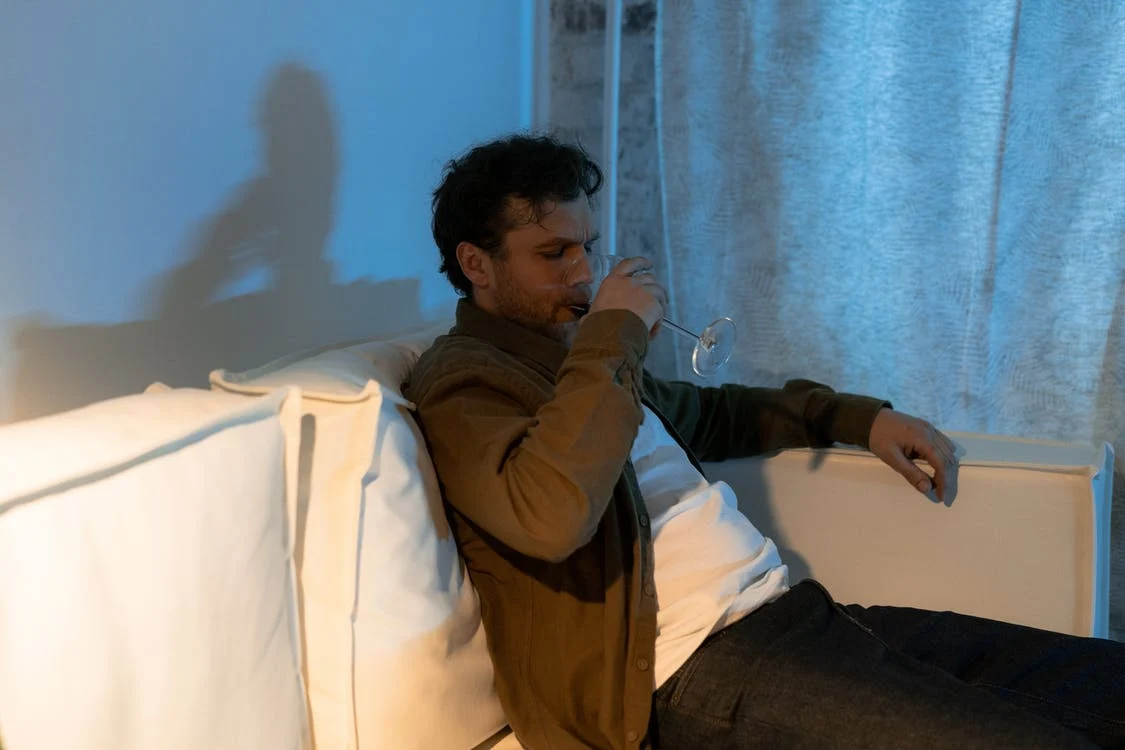
Image by cottonbro from Pexels
Moreover, intoxication may result in frequent waking, vivid nightmares, and drowsiness the day after. It is recommended to steer clear of indulging in a drink or two at least four hours before going to bed. Note that you should never mix sleeping pills and alcohol as it could trigger a harmful interaction resulting in impaired memory and sleepwalking.
Myth #12: Dreams mean bad sleep
It's a frequent misconception that dreaming indicates poor sleep quality. On the contrary, it is completely normal and is actually a component of sound sleep. Vivid dreams typically occur during REM sleep, which happens an hour to one hour and 30 minutes after falling asleep.
Dreams are believed to contribute to restorative slumber and improved cognitive function. However, having nightmares is a whole different story as it can adversely affect your sleep.
Myth #13: Long naps compensate for nighttime sleep deprivation

Image by Andrea Piacquadio from Pexels
Power naps may help you feel more alert, but they can't replace a good night's sleep. This is because they don't follow the same pattern of progressive muscle relaxation.
Naps are frequently used by those who are sleep deprived, but this strategy often backfires by making it much more difficult to fall asleep at a regular bedtime. When you wake up from a long snooze, you may feel groggy and confused.
Myth #14: A good sleeper can sleep anytime, anywhere
It may seem like a special talent but the ability to nod off at the drop of a hat is indicative of sleep issues, as opposed to being a "good sleeper."
Excessive daytime sleepiness is typically a symptom of insomnia, insufficient sleep, or an underlying sleep condition like sleep apnea, but this misconception paints it in a favorable light, which is dangerous. Circadian rhythm abnormalities and narcolepsy have been linked to nighttime sleepiness.
As mentioned, circadian rhythms are like your biological clocks, which include your sleep-wake cycle. They aid in maintaining a regular pattern of sleep and wakefulness throughout the day.
Myth #15: You can sleep best in a warmer bedroom

Featuring Weavve's Signature TENCEL™ Classic Set in Fern Green
When you drift off to dreamland, your core body temperature dips. Hotter rooms are not conducive to restorative sleep as they impede your body’s instinct to rest.
Opt for the temperature most comfortable for you. Some experts would recommend 18°C to 26°C room temperature.
Apart from a cold room temperature, the best way to sleep well is to invest in temperature-regulating sheets and quality bedding. Luxury bed sheets like TENCEL™ are renowned for their sustainable and moisture-wicking properties, perfect for keeping hot sleepers cool and sweat-free no matter the weather.
To help you choose the best bed sheets for you, take into consideration the quality, type of material, thread count, price, and more.
Discover Weavve’s Bedding Collection
TENCEL™ Lyocell Bed Sheets
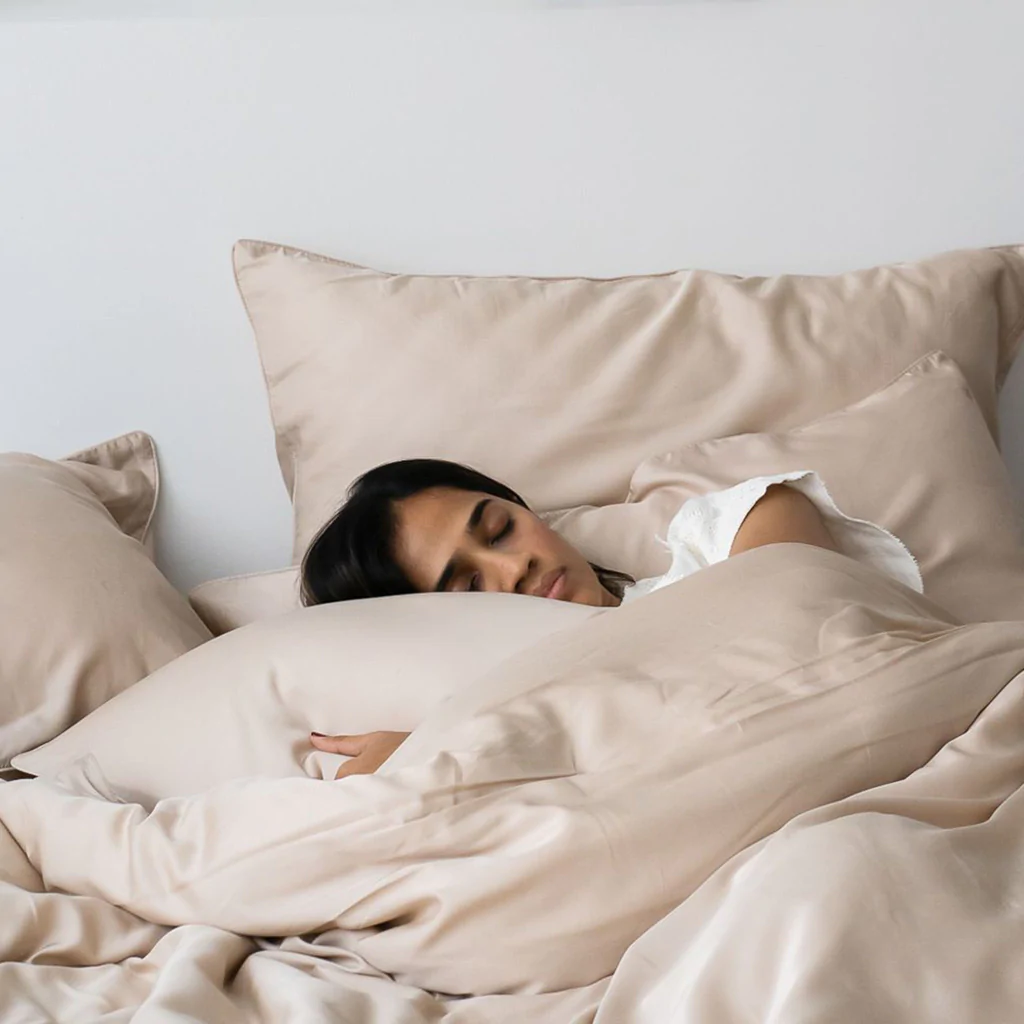
Featuring Weavve's TENCEL™ Lyocell Bed Sheets in Sand Taupe
Breathable, absorbent bedding sheets are a must-have for those who want to stay cool throughout the night. Props to the smooth, soft, and luxurious TENCEL™ Lyocell sheets, you can count on getting a sound sleep - free of night sweats!
The greatest Lyocell fibers (100% Lenzing TENCEL™) are spun into the finest threads with an 80s yarn count. Woven into a 400 thread count fabric using delicate single-ply threads, these sheets are guaranteed stronger, smoother, and lighter.































